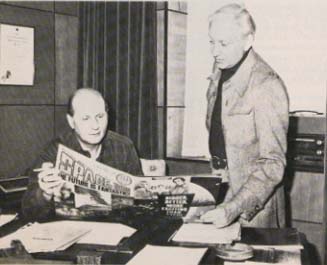STARLOG EXCLUSIVEAn Interview withFRED FREIBERGERPart II----------By MIKE CLARK & BILL COTTER---------- |
|||||
|
retreat somewhere. . .had left acting. The original Maya was to have been a black girl. We did test a lot of black girls in England. We would have loved Teresa Graves, but we couldn't get her. Abe Mandell recommended Catherine Schell; we looked at the Pink Pan- ther film she was in and were quite impressed. The character of Maya was a tough con- cept to sell to the British writers, but for some reason, easier to sell to the Americans. I knew that science-fiction fans would accept this character if we did it right. SL: Were you considering major cast changes for Year II? FF: When I went over to England, Barry Morse played a scientist in the series. I said, "Gerry, if you're going to have anybody as a professor, he should be a young kid with a beard. Do something different. Another problem with the show is that you can't have people standing around and talking and be- ing philosophical with these long speeches. . . nobody will hold still for it. Let's do some switches on the characters." There was a big question of the budget. We made several trans-Atlantic calls to Martin Landau and Barbara Bain. . .would they take a salary cut? They wouldn't take a cut. People assume when you're making an offer that you're lying and that they're in the driver's seat. This show was on the edge for weeks. . .it looked like we were finished. I stayed an extra week, and then it looked like 1999 had a life when I came up with Maya. SL: What happened to Barry Morse? FF: Barry Morse's agent came in demanding a big raise. Gerry made him a counter-offer. Morse's agent made a bad tactical error which was sheer insanity for an agent. He said, "No. If it's not going to be that amount we're finished. We're out." So immediately Gerry said, "Okay, you're out." What an agent should say is, "He's out. . .except. . . I'll have to check with him." We had big discussions about how to ex- plain the disappearance of Professor Berg- man, that he had a disease or something, and they asked us to take it out. Barry Morse is an excellent actor, but I felt his part was all |
||||
 |
 |
